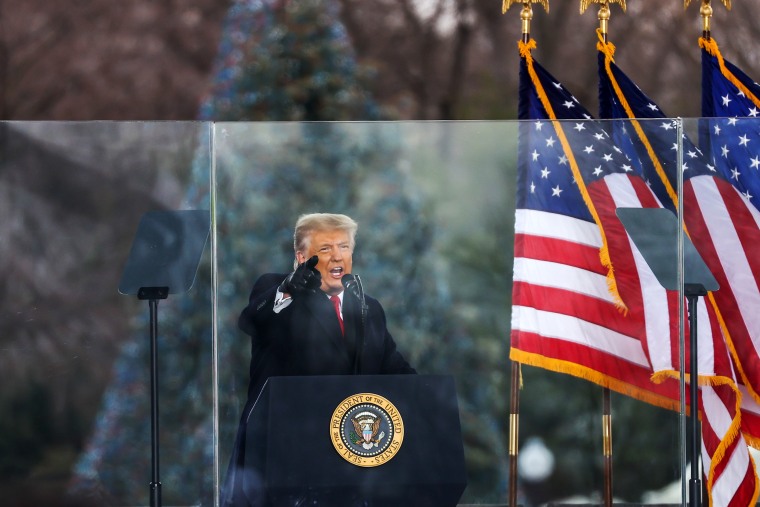For Donald Trump, the outcome of the Senate impeachment trial appeared to offer at least some good news: a bipartisan majority voted to convict him, but the majority wasn't large enough. The bad news, as the New York Times noted over the weekend, is that the political proceedings probably won't be "the last or decisive word on his level of culpability in the assault on the Capitol last month."
While the Justice Department officials examining the rash of crimes committed during the riot have signaled that they do not plan to make Mr. Trump a focus of the investigation, the volumes of evidence they are compiling may eventually give a clearer — and possibly more damning — picture of his role in the attack. Case files in the investigation have offered signs that many of the rioters believed, as impeachment managers have said, that they were answering Mr. Trump's call on Jan. 6.
We've been gradually moving in this direction over the last several weeks. Just a few days after the deadly attack, Andrew McCabe, the former deputy director of the FBI, and David Williams, the former inspector general for five federal agencies, wrote a joint op-ed for Politico raising the prospect of "criminal charges" against Trump, noting that it's a federal crime to "endeavor to persuade" another person to commit a felony that includes the threat or use of physical force.
The Washington Post reported soon after that Trump's own legal advisers "expressed increasing concern" about the Republican's "possible criminal liability." The article added that Trump "has been told by attorneys that he could face legal jeopardy for inciting a mob."
This came to the fore again last week when Bruce Castor, one of the former president's lead defense attorneys, told senators during the impeachment trial that they need not worry about holding Trump accountable -- because if the Republican crossed legal lines, federal law enforcement could prosecute him.
"There is no opportunity where the president of the United States can run rampant in January at the end of his term and just go away scot-free," Castor said. "The Department of Justice does know what to do with such people." The attorney added that if a president commits crimes after the election, "after he's out of office, you go and arrest him."
And while it was odd to hear Trump's own lawyer making such comments during the proceedings, the comments apparently reflect a real fear for the former president. CNN reported over the weekend:
Former President Donald Trump has privately voiced concern in the last two weeks about whether he could face charges as a result of the January 6 riot he's accused of inciting, according to multiple people. ... "He's worried about it," one adviser close to Trump told CNN.
The fear is hardly unreasonable. The Senate impeachment trial was effectively a game rigged in his favor, but the federal criminal justice system would be far more difficult.
Indeed, last week's trial offered a series of reminders about just how significant Trump's criminal liability could be. The Senate proceedings, for example, produced new information that could be used against the former president: the details of the expletive-laden Jan. 6 argument between Trump and House Minority Leader Kevin McCarthy is of particular interest.
What's more, let's not brush past the fact that Trump's lawyers made a series of claims during the Senate trial that simply weren't true -- see here, here, here -- and while Senate Republicans were tolerant of such dishonesty, the former president's legal defense team, which played a weak hand badly, wouldn't get away peddling falsehoods in a traditional Article III courtroom.
Indeed, what became painfully obvious last week is that Trump is guilty. His lawyers struggled to defend him because the former president's misconduct is indefensible.
Is it any wonder the Republican is reportedly "worried about" possible prosecution?
For those keeping score, Trump is already facing criminal investigations in New York and Georgia. There's no reason to assume that list won't grow.

